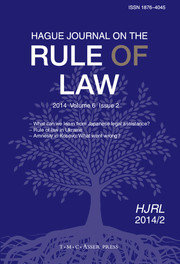Article contents
Rethinking Justice Reform in Fragile and Conflict-Affected States: Lessons for Enhancing the Capacity of Development Agencies1
Published online by Cambridge University Press: 26 March 2012
Abstract
Over the last four decades, donor-driven justice reform efforts have largely followed two parallel paradigms: one primarily concerned with promoting development and economic growth, the other centered on state-building and the consolidation of peace in countries emerging from violent conflict. Operationally, however, these models face the same conundrum: they draw on a broad consensus that justice institutions are intrinsically and instrumentally important for development, and yet have a track record demonstrating that much remains to be learned. These paradigms have increasingly converged in recent years, as exemplified in the World Development Report 2011 (on conflict and security), providing a basis for rethinking approaches to justice reform in fragile and conflict-affected states. These approaches are based on an alternative theory of change, a long-term commitment to investing in research to understand the idiosyncrasies of local contexts, and a more nuanced approach to building locally legitimate justice institutions capable of mitigating the societal stresses that feed cycles of conflict.
Keywords
- Type
- Articles
- Information
- Hague Journal on the Rule of Law , Volume 4 , Special Issue 1: Special Issue on Security Sector Reform and Rule of Law , March 2012 , pp. 54 - 75
- Copyright
- Copyright © T.M.C. Asser Press and the Authors 2012
References
1 This paper is based on a chapter in the World Development Report 2011 (November 5, 2010, available at http://wdr2011.worldbank.org/justice), and presentations made by Minister of Justice Tah of Liberia, Chief Justice Azimi of Afghanistan, Michael Woolcock (World Bank) and Pablo de Greiff (International Center for Transitional Justice) at the World Bank's ‘Law, Justice and Development Week’ held in Washington, DC, in November 2010. Th e views expressed in this paper are those of the authors alone, and should not be attributed to the World Bank, its executive directors or the countries they represent. An earlier version of this article was published in: 3 World Bank Legal Review (2011), pp. 241-262
- 5
- Cited by




